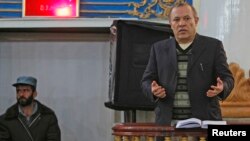ISLAMABAD —
A tribunal in Afghanistan has sentenced two of the former heads of the country's first private bank, formerly named Kabul Bank, to five years in prison each for involvement in a multi-million-dollar fraud that led to the institution's collapse in 2010. But observers have criticized the verdict as too lenient given the extent of the fraud.
The head of the three-judge Afghan Supreme Court special tribunal, Shamsul Rahman Shams, handed down the sentences in the presence of the defendants and independent observers.
The judge said the court found Kabul Bank's former chairman, Sherkhan Farnood, and former chief executive officer, Khalilullah Ferozi, guilty of misappropriating $278 million and $530 million, respectively. He added the two men are each being sentenced to five years in prison and must repay the stolen funds.
The senior bankers have been under house arrest for more than a year and, according to the court ruling, that period of detention is included in their sentences. They were among 21 Kabul Bank and government employees convicted for involvement in the corruption scandal. However, the other defendants were given lesser sentences. All of the defendants have the right to appeal Tuesday's ruling.
Representatives of Afghanistan's Independent Joint Anti-Corruption Monitoring and Evaluation Committee were in attendance during Tuesday's court proceedings. Its chairman, Drago Kos, criticized the punishment as "relatively light."
"We can describe our feeling about his verdict in one word: disappointment," he said.
He said the recovery of the stolen funds will be difficult because the special tribunal did not register a conviction for money laundering, which would have permitted the confiscation of millions of dollars being held in foreign bank accounts.
"The chances to recover the stolen money are limited almost down to zero because the court has not used the anti-money laundering legislation of Afghanistan," he said.
Tuesday's judgment followed three years of detailed investigations into corruption that deprived the Kabul Bank of more than $900 million and triggered a financial crisis, civil disorder and a run on deposits in the war-ravaged nation. The bank was bailed out by the government and has since been renamed New Kabul Bank.
The Afghan special tribunal did not charge several other influential people allegedly implicated in the scam as shareholders, including a brother of President Hamid Karzai.
Afghanistan's donors, led by the United States, have promised billions of dollars in aid after NATO forces withdraw at the end of 2014. However, they are demanding the Karzai government bring the rising wave of corruption under control.





